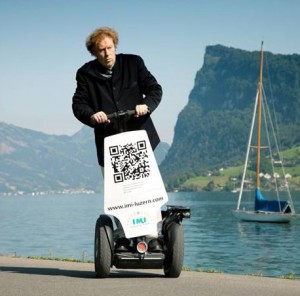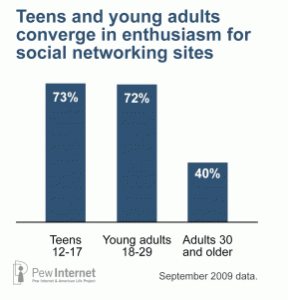
Young expat professionals do not respond to traditional campaigns. They’re not interested in photos of dressed up models or sanitized PR speak. What they crave for is authenticity, says Lukas Ritzel, Marketing & Web Strategist at Switzerland’s IMI University Centre–and they’re looking for it on social media sites. In an interview with Expat Marketing, Lukas explains why traditional marketing managers are struggling to cope.
Lukas, why is it so many marketing managers have been so slow to embrace new media?
Part of is generational. The older generation is much slower with technology. And naturally there’s always resistance to new things. This is especially true of big schools. Sometimes it seems like the Harvards and Oxfords would prefer to go back to medieval times. [Laughs] Another problem is managers don’t know how to use social media.
Can you give an example?
A lot of managers are afraid of Facebook because they’re scared of negative comments. They want to control everything. But we found that when someone writes something negative, often other people will respond to disagree. Then we don’t have to do anything at all, and it comes off as more authentic–which of course it is.
That can’t be true of every Facebook page, though. What separates your success from the failures?
To do it properly you need to build a tribe. Once you create a sense of community and group identity you actually end up with a very dedicated, self-sustaining marketing team.
IMI has 5,000 friends on Facebook, and they are engaging with the page. What strategies have you used to build that identity?
Integrating sites like Facebook into the teaching style. Using them for practical things like class announcements or event promotion.
Next – if a student asks about the university you don’t send him to the website, you send him to the Facebook page. There he can ask questions directly to other students. If you post a lot of photos, like us, he can also see the school, events, speakers. He knows you can’t fake that.

Does this approach make it more difficult to communicate across language or cultural barriers?
Actually we’ve found the divide is not national as much as generational. A Korean student does not really see himself as that different from a Thai student. However both see themselves as very different from their parents. Because that generation, the managerial generation, is so much slower with technology.
So technology has made national identities less relevant?
National and social identities still have a major influence on the specific brands of technology students use. At IMI most of our students are Asian expats from wealthy families. The men use iPhones and iPads. The women use Blackberries. Students from Eastern Europe prefer Android phones. They are also more into the open-source culture.
Do these different technology preferences change the channels you might use to reach these young expats?
It’s certainly important to consider in relation to your program’s image. Our students prefer expensive Apple products. This fits with the character of hospitality management. We require our students to look very polished. That’s what it will be like for them in the workplace.
Where will social media be in 5 years?
Everything is going to be rated, and it will happen in real time. We’re moving towards and “augmented reality.” That is to say, a blurred line between online and offline. You will be able to hold your smartphone up on the street and on the phone you’ll see the same street, but with ratings for all the shops and restaurants.
Have you seen any evidence of this among your students?
If I talk to them about being “offline” they don’t get it. For them there’s no such thing as “offline.” They’re always on.
What would you say to the doubters and skeptics in the industry?
IMI is a fairly small school. We are the only family-owned hospitality management school in Switzerland in fact. Yet because we innovate, because we are creative, we are able to compete with schools that have marketing budgets 50 times our size.
Lukas Ritzel is Web & Marketing Strategist at IMI University in Switzerland. He has more than 15 years managing media projects for businesses, and is an active guest lecturer on media trends. He is also co-founder and co-owner of global consulting firm Prasena. http://www.prasena.com